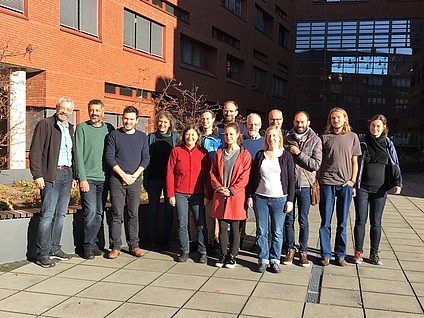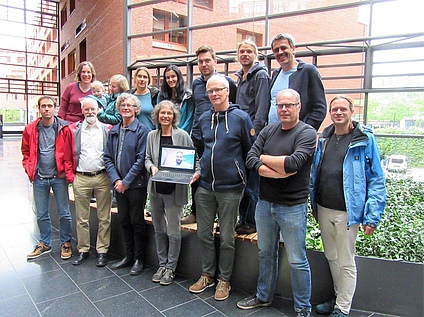sREplot - Upscaling of individual species dynamics to community trends in biodiversity and composition using vegetation change data sets
First meeting: 13.-16.11.2018
PIs:
Lander Baeten
Markus Bernhardt-Römermann
Ute Jandt
iDiv member:
Ute Jandt
Project summary:
Evidence across biomes and taxonomic groups reveals that temporal changes in local-scale species diversity are quite small compared to large and widespread changes in community composition. As a result, it is likely the changes in composition, rather than in diversity itself, that will have the greatest impact on how these communities function. This points to a critical need to better understand which (types of) species contribute most to these compositional shifts. New methodological advances now permit quantifying how individual species changes scale up to community change, but such analyses rely on appropriate data. Contemporary resurveys of legacy data offer detailed plot-based community data over decadal time scales and are particularly suitable to address fundamental questions about the causes and consequences of temporal community change and the functional or phylogenetic basis for such change. We will initially analyse a database of 62 single high-quality forest vegetation resurvey studies from temperate forests that span ≥20 years (>3200 vegetation plots). Using hierarchical meta-analytic models and the latest computational approaches, we will test which kind of species consistently decrease, increase or show idiosyncratic patterns within and across studies. Then, capitalizing on the expertise to synthesise compositional changes in for-est vegetation, we will explore ways to synthesise across vegetation change databases, quantifying how communities have changed over time in various vegetation. Our analyses will inform both fundamental ecological theory and applied predictions of vegetation change rele-vant to several initiatives (e.g. IPBES and GeoBON) aiming to quantify and summarize biodiversity changes across the worlds biomes during the Anthropocene.
Participants:
Lander Baeten (Ghent University), Markus Bernhardt-Römermann (Institute of Ecology and Evolution, Friedrich Schiller University Jena), Anne Bjorkman (Senckenberg Biodiversity and Climate Research Centre), Jörg Brunet (Swedish University of Agricultural Sciences), Pieter De Frenne (Ghent University), Caroline Greiser (Stockholm University, DEEP), Radim Hédl (Institute of Botany of the Czech Academy of Sciences), Ute Jandt (Martin Luther University Halle-Wittenberg, Geobotany and Botanical Garden), Jonathan Lenoir (Université de Picardie Jules Verne), Frantisek Malis (Technical University in Zvolen), Johanna Otto (Friedrich Schiller Universität Jena, Institut für Ökologie und Evolution), Kris Verheyen (Ghent University), Don Waller (University of Wisconsin - Madison), Monika Wulf (Leibniz-ZALF)
Second meeting: 14.-17.05.2019
Participants:
Lander Baeten (Ghent University), Markus Bernhardt-Römermann (Friedrich Schiller University Jena), Anne Bjorkman (Senckenberg Biodiversity & Climate Research Centre), Gergana Daskalova (University of Edinburgh), Pieter De Frenne (Ghent University), Martin Diekmann (Vegetation Ecology and Conservation Biology, Institute of Ecology), Radim Hédl (Institute of Botany, Czech Academy of Sciences), Ute Jandt (Martin Luther University Halle-Wittenberg), Isla Myers-Smith (University of Edinburgh), Harald (Austrian Academy of Sciences & University of Natural Resources and Life Sciences Vienna), Ingmar Staude(iDiv), Kris Verheyen (Ghent Universtiy), Don Waller (University of Wisconsin – Madison), Sonja Wipf (WSL Institute for Snow and Avalanche Research SLF)
Publications:
Staude, I.R., Waller, D.M., Bernhardt-Römermann, M. et al. (2020) Replacements of small- by large-ranged species scale up to diversity loss in Europe’s temperate forest biome. Nature Ecology and Evolution. See here.
Staude, I.R., Pereira, H.M., Daskalova, G.N., Bernhardt-Römermann, M., Diekmann, M., Pauli, H., et al. (2021) Directional turnover towards larger-ranged plants over time and across habitats. Ecology Letters, 00, 1– 17. See here.


